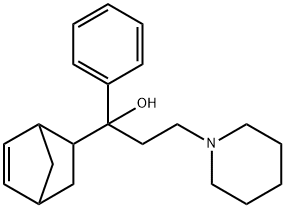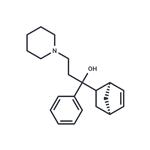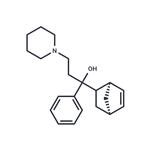Description
Biperiden has a relatively weak visceral anticholinergic, but a strongnicotinolytic, action in terms of its ability to block nicotineinducedconvulsions. Therefore, its neurotropic action israther low on intestinal musculature and blood vessels.Its action on the eye, althoughmydriatic, is much lower than that of atropine. These weakanticholinergic effects add to its usefulness in Parkinson syndromeby minimizing side effects.
Uses
Biperiden is used alone or together with other medicines (e.g., levodopa) to treat Parkinson's disease. It is also used to control severe muscle reactions.
Pharmacology
Biperiden has an atropine-like blocking effect on all peripheral structures which are parasympathetic-innervated (e.g. cardiovascular and visceral organs). It also has a prominent central blocking effect on M1 receptors. Biperiden does also act as FIASMA (functional inhibitor of acid sphingomyelinase).
Side effects
Common side effects include blurred vision, dry mouth, sleepiness, constipation, and confusion.
Toxicity
Poison by ingestion,subcutaneous, intraperitoneal, and intravenous routes.When heated to decomposition, it emits toxic fumes ofNOx.
Precautions
Biperiden should not be used in people with a bowel obstruction or glaucoma.It is unclear if use in pregnancy or breastfeeding is safe.



